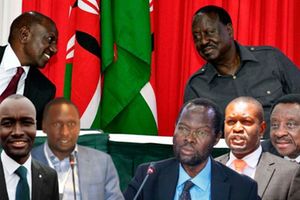
The court has refused to stop EACC and police from arresting Kerra boss Joseph Kimata.
A senior official at the Kenya Rural Roads Authority (Kerra) has failed in his bid to stop the anti-corruption agency and police from arresting or charging him over alleged conflict of interest involving Sh311 million contracts.
Mr Joseph Kimata, one of the authority's engineers and the regional director in Kirinyaga County, wanted the court to grant him anticipatory bail after the Ethics and Anti-Corruption Commission (EACC) raided his home.
The engineer is alleged to have used a proxy to trade with Kerra in 2016 and 2023, thus accumulating unexplained wealth.
He also applied for an order barring EACC, the Inspector General of Police and Director of Public Prosecutions (DPP) from arresting, charging or harassing him without conducting investigations and according him an opportunity to be heard.
However, Justice Benjamin Musyoki threw out the application, saying the court could not stop a statutory body from performing its statutory and constitutional mandate.
He said the court could not intervene unless it was shown that the statutory body was doing so maliciously, capriciously or in an unlawful manner, and in violation of the rights of the applicant.
"A mere fear, apprehension or speculation of the possibility of being arrested is not a sufficient ground for granting an application for anticipatory bail," he ruled.

Integrity Centre in Nairobi which houses the Ethics and Anti Corruption Commission offices.
The investigations involved suspected cases of conflict of interest and misappropriation of funds at the Kerra’s Kiambu region for the financial years 2015/2016 and 2022/2023.
The court also noted that Mr Kimata had admitted that investigations have been going on since January 2024 and he had not been arrested, although the EACC investigators conducted a search under a valid warrant.
Mr Kimata had claimed that the EACC officers arrested his wife on September 4, 2024, during the search exercise at his home, carted his documents and harassed his family.
"There is no claim or evidence that after the applicant’s wife was arrested, she was unlawfully detained or her rights violated which would give the applicant apprehension of violation of his rights if he were to be arrested," said the judge in the ruling.
EACC, in opposition to the application, said the official was being investigated for engaging in conflict of interest by trading with Kerra through a proxy involving a sum of Sh311,125,109 between 2016 and 2023.
Through its representative, Christine Ombaka, EACC said it received information on cases of conflict of interest and accumulation of unexplained wealth by Mr Kimata.
She added that the investigations did not violate Mr Kimata's rights as the commission followed the law and it was in public interest that the investigations be concluded.
Specific tender
Mr Kimata informed court that although EACC had said that investigations concerned tenders in Kiambu for the period of 2016 to 2023, he was transferred from Kiambu region to Kirinyaga in 2016.
When he went to the EACC's offices after being summoned, he was interrogated on a specific tender in Kerugoya and not Kiambu.
He complained that he was on the verge of being arrested and charged out of "malicious and baseless investigations and that the respondents’ actions are a violation of the applicant’s constitutional rights".
The court told him that EACC had no mandate to charge or prosecute him and the mandate lies with the DPP, who evaluates evidence gathered and presented.
"That stage has not been reached and granting restraining orders will in my view be taking away constitutional and statutory mandate of the DPP against whom no case has been made out," said Justice Musyoki.







